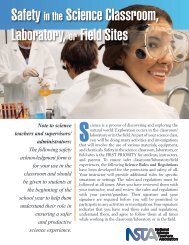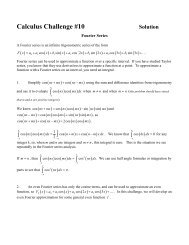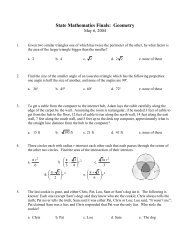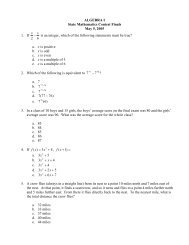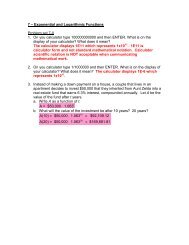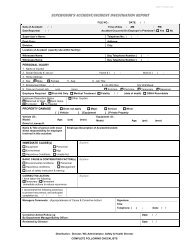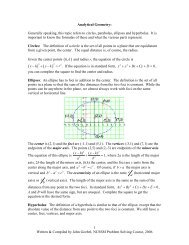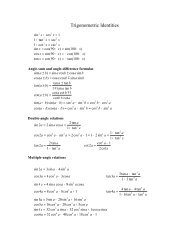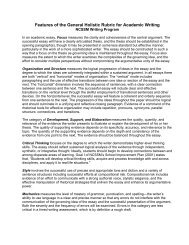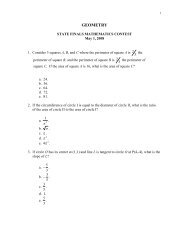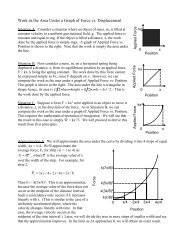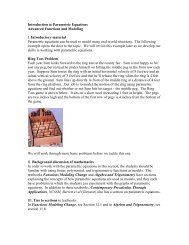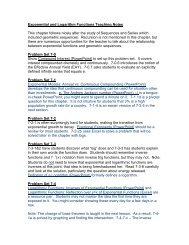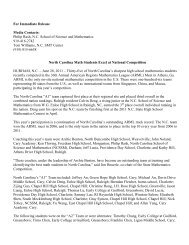NCSSM COURSE CAtAlOG - North Carolina School of Science and ...
NCSSM COURSE CAtAlOG - North Carolina School of Science and ...
NCSSM COURSE CAtAlOG - North Carolina School of Science and ...
You also want an ePaper? Increase the reach of your titles
YUMPU automatically turns print PDFs into web optimized ePapers that Google loves.
Thus, the curriculum content <strong>and</strong> processes <strong>of</strong> analyses are organized around<br />
holistic, ill-structured, real world "problems,” simulations, <strong>and</strong> case studies. These<br />
experiences are designed to be <strong>of</strong> an integrated <strong>and</strong> multi-layered nature <strong>and</strong><br />
provide opportunities to discover <strong>and</strong> apply the Microeconomics concepts from<br />
our readings <strong>and</strong> discussions. In taking this consciously constructivist approach,<br />
we integrate other disciplines into the study <strong>of</strong> Microeconomics. Elements from<br />
the fields <strong>of</strong> psychology, history, political science, <strong>and</strong> mathematics all have<br />
roles to play as we propose resolutions to our Microeconomic problems, case<br />
studies, <strong>and</strong> simulations.<br />
SS404 AP Macroeconomics (I)<br />
One trimester<br />
Credit: One unit core elective credit.<br />
Meeting pattern: Two 75-minute evening class meetings.<br />
This course <strong>of</strong>fers an opportunity for immersion in both a fascinating discipline<br />
<strong>and</strong> in logical thinking. This immersive process involves not only Macroeconomic<br />
theory but investigations into the very essence <strong>of</strong> the discipline itself through<br />
three case studies or strategic problems involving global commodity price<br />
movements, designing simulated national Macroeconomic policies for a<br />
globalized marketplace environment, <strong>and</strong> prognostication studies <strong>of</strong><br />
sustainability. The basic theoretical structures <strong>of</strong> Macroeconomics, as found in<br />
our readings <strong>and</strong> discussions, are woven through these three experiences during<br />
the course. These three experiences are researched within the context <strong>of</strong> a<br />
fourth, trimester-long problem in the simulated trading <strong>of</strong> financial instruments<br />
<strong>and</strong> strategic commodities in our Paratrade environment. This longer,<br />
overarching problem allows us the opportunity to apply recently acquired<br />
Macroeconomic theory to a simulated real-world environment.<br />
SS406 AP Psychology (I)<br />
One trimester<br />
Credit: One unit core elective credit.<br />
Meeting pattern: Four periods per week.<br />
This course provides an introduction to the scientific study <strong>of</strong> behavior <strong>and</strong><br />
consciousness. Key topics include the neurobiological basis <strong>of</strong> behavior,<br />
perception, consciousness, learning, memory, <strong>and</strong> thinking. We also explore<br />
motivation, personality, normal <strong>and</strong> abnormal behavior, psychotherapy, <strong>and</strong><br />
social factors in behavior.<br />
SS410 AP Psychology (II)<br />
One trimester<br />
Credit: One unit core elective credit.<br />
Prerequisite: B or higher grade in SS406 AP Psychology (I).<br />
28



